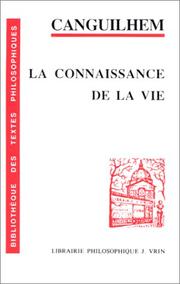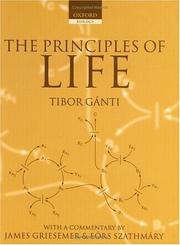| Listing 1 - 6 of 6 |
Sort by
|

ISBN: 2711611329 9782711611324 Year: 2006 Publisher: Paris: Vrin,
Abstract | Keywords | Export | Availability | Bookmark
 Loading...
Loading...Choose an application
- Reference Manager
- EndNote
- RefWorks (Direct export to RefWorks)
Qu'est-ce que l'expérimentation en biologie ? Quelle différence y a-t-il entre un organisme et une machine ? Que faut-il entendre par "normal" et par "pathologique" ? Dans ce recueil d'articles consacrés à la médecine et aux sciences biologiques, Georges Canguilhem passe en revue un certain nombre de questions soulevées par la vie et les diverses manières de la représenter. Il montre comment, dans les théories du vivant, s'articulent, selon des configurations souvent complexes, la prise en compte des données de l'observation et l'influence du contexte culturel, philosophique et même parfois politique. L'ouvrage donne ainsi à comprendre que la biologie, comme toute autre science d'ailleurs, n'est pas issue de la seule observation des faits. Au-delà de cette perspective historique et épistémologique, Canguilhem propose, en particulier dans son article "Le Normal et le Pathologique", une véritable philosophie du vivant comme un être singulier, dont les normes sont individuelles et irréductibles à des lois générales.
Book
ISBN: 2871930023 9782871930020 Year: 1986 Publisher: Bruxelles Crédit Communal de Belgique
Abstract | Keywords | Export | Availability | Bookmark
 Loading...
Loading...Choose an application
- Reference Manager
- EndNote
- RefWorks (Direct export to RefWorks)
Titre néerlandais : N10774 : Ten tijde van de Spy-mens
Anthropologie --- Antropologie --- Namen (provincie) --- Namur (province) --- Prehistorie --- Préhistoire --- Institut royal des sciences naturelles de Belgique --- Archéologie --- Belgique --- Exposition --- Histoire --- 573.3 --- 573.3 Living and dead matter, their chemical and structural differences --- Living and dead matter, their chemical and structural differences --- Institut royal des sciences naturelles de Belgique. --- Paléolithique --- Néandertaliens

ISBN: 0198507267 9780198507260 Year: 2003 Publisher: Oxford: Oxford university press,
Abstract | Keywords | Export | Availability | Bookmark
 Loading...
Loading...Choose an application
- Reference Manager
- EndNote
- RefWorks (Direct export to RefWorks)
Life (Biology) --- Biochemistry --- 573.7 --- 573.3 --- Biology --- Biological chemistry --- Chemical composition of organisms --- Organisms --- Physiological chemistry --- Chemistry --- Medical sciences --- General properties and characteristics of living systems --- Living and dead matter, their chemical and structural differences --- Composition --- Biochemistry. --- 573.3 Living and dead matter, their chemical and structural differences --- 573.7 General properties and characteristics of living systems --- Life (Biology). --- Acqui 2006
Book
ISBN: 9781571135384 1571135383 9781571138392 1571138390 1283836459 Year: 2012 Publisher: Rochester, N.Y. : Camden House,
Abstract | Keywords | Export | Availability | Bookmark
 Loading...
Loading...Choose an application
- Reference Manager
- EndNote
- RefWorks (Direct export to RefWorks)
Robert Musil, known to be a scientific and philosophical thinker, was committed to aesthetics as a process of experimental creation of an ever-shifting reality. Musil wanted, above all, to be a creative writer, and obsessively engaged in almost endless deferral via variations and metaphoric possibilities in his novel project, 'The Man without Qualities.' This lifelong process of writing is embodied in the unfinished novel by a recurring metaphor of self-generating de-centered circle worlds. The present study analyzes this structure with reference to Musil's concepts of the utopia of the Other Condition, Living and Dead Words, Specific and Non-Specific Emotions, Word Magic, and the Still Life. In contrast to most recent studies of Musil, it concludes that the extratemporal metaphoric experience of the Other Condition does not fail, but rather constitutes the formal and ethical core of Musil's novel. The first study to utilize the newly published Klagenfurt Edition of Musil's literary remains (a searchable annotated text), 'The World as Metaphor' offers a close reading of variations and text genesis, shedding light not only on Musil's novel, but also on larger questions about the modernist artist's role and responsibility in consciously re-creating the world. Genese Grill holds a PhD in Germanic Literatures and Languages from the Graduate School and University Center of the City University of New York.
Metaphor in literature. --- Musil, Robert, --- Art. --- Literary Analysis. --- Living and Dead Words. --- Metaphor. --- Modernist Literature. --- Other Condition. --- Philosophy. --- Reality. --- Robert Musil. --- Still Life. --- The Man without Qualities. --- The World as Metaphor in Robert Musil's The Man without Qualities. --- The World as Metaphor. --- Utopia. --- Word Magic. --- artistic creation. --- literary remains. --- metaphoric experience. --- metaphoric possibilities. --- modernist artist. --- modernist literature. --- re-creating the world.
Book
ISBN: 9028918213 9789028918214 Year: 1993 Publisher: Kapellen : Pelckmans,
Abstract | Keywords | Export | Availability | Bookmark
 Loading...
Loading...Choose an application
- Reference Manager
- EndNote
- RefWorks (Direct export to RefWorks)
Overzicht van de huidige inzichten over het ontstaan van het leven.
Philosophy of nature --- Biologie --- Evolutieleer --- Evolution des espèces --- Sciences --- Wetenschappen --- 573.3 --- 573.5 --- 573.7 --- #gsdbf --- #GROL:SEMI-128 --- #WPLT:dd.Prof.J.Van Assche --- 524.8 --- 575.82 --- 573.1 --- Biosfeer 2 --- DNA --- Leven --- RNA --- 575.8 --- Leven : ontstaan --- C6 --- wereld (x) --- biologie --- Living and dead matter, their chemical and structural differences --- Problem of the origin of life. Life on other planets. Exobiology --- General properties and characteristics of living systems --- Leven en dood --- Opvoeding, onderwijs, wetenschap --- 573.7 General properties and characteristics of living systems --- 573.5 Problem of the origin of life. Life on other planets. Exobiology --- 573.3 Living and dead matter, their chemical and structural differences --- Biogenesis. --- Life --- Molecular evolution. --- Philosophy of nature. --- Origin.
Book
ISBN: 1282771795 9786612771798 0520947924 9780520947924 9781282771796 9780520256835 0520256832 9780520256842 0520256840 Year: 2010 Publisher: Berkeley : University of California Press,
Abstract | Keywords | Export | Availability | Bookmark
 Loading...
Loading...Choose an application
- Reference Manager
- EndNote
- RefWorks (Direct export to RefWorks)
In a riveting first-person account, Todd Ramón Ochoa explores Palo, a Kongo-inspired "society of affliction" that is poorly understood at the margins of Cuban popular religion. Narrated as an encounter with two teachers of Palo, the book unfolds on the outskirts of Havana as it recounts Ochoa's attempts to assimilate Palo praise of the dead. As he comes to terms with a world in which everyday events and materials are composed of the dead, Ochoa discovers in Palo unexpected resources for understanding the relationship between matter and spirit, for rethinking anthropology's rendering of sorcery, and for representing the play of power in Cuban society. The first fully detailed treatment of the world of Palo, Society of the Dead draws upon recent critiques of Western metaphysics as it reveals what this little known practice can tell us about sensation, transformation, and redemption in the Black Atlantic.
Palo. --- Afro-Caribbean cults --- Death --- Religious aspects. --- Cuba --- Religious life and customs. --- Religion --- anthropology. --- black atlantic. --- comparative religion. --- cuba. --- cuban society. --- cultural anthropologists. --- discussion books. --- ethnic tribal. --- ethnographers. --- ethnography. --- havana. --- kongo. --- living and dead. --- nonfiction. --- palo. --- personal account. --- popular religion. --- praise of the dead. --- quita manaquita. --- religious practices. --- religious rituals. --- religious scholars. --- religious studies. --- sorcery. --- spiritual. --- transformation. --- tribal practices. --- western perspective. --- world religions. --- Afro-Caribbean religions
| Listing 1 - 6 of 6 |
Sort by
|

 Search
Search Feedback
Feedback About UniCat
About UniCat  Help
Help News
News